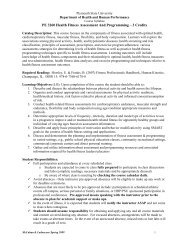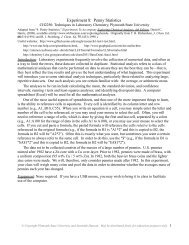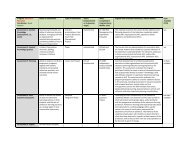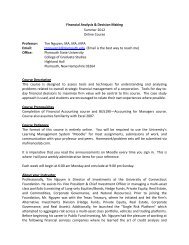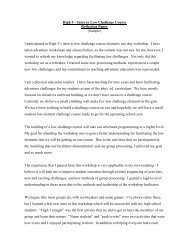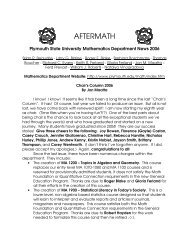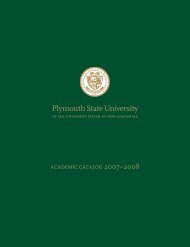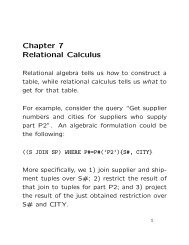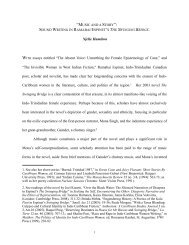You also want an ePaper? Increase the reach of your titles
YUMPU automatically turns print PDFs into web optimized ePapers that Google loves.
Little is known of Isabella Whitney following the publication of A <strong>Sweet</strong> <strong>Nosegay</strong>. She mentioned in herw<strong>or</strong>k that she had lost her position serving a wealthy lady, which had f<strong>or</strong>ced her into financial difficulties.Whitney fled London and her literary circle to avoid her credit<strong>or</strong>s (Panofsky xii). It is possible that shemarried a man named Eldershae, and with him had two children because a Sister Eldershae is mentioned inher brother Geoffrey's will (Fehrenbach 10). Whatever Whitney's fate may have been, her two publishedw<strong>or</strong>ks f<strong>or</strong>ged a path f<strong>or</strong> subsequent women writers seeking publication. Her w<strong>or</strong>ks today can be regarded asvaluable from both a literary and a hist<strong>or</strong>ical standpoint.W<strong>or</strong>ks CitedFehrenbach, R.J. "Isabella Whitney, Sir Hugh Plat, Geoffrey Whitney, and Sister Eldershae."Language Notes 21 (1983): 7-11.Panofsky, Richard J., ed. Introduction. Floures of Philosophie. NY: Scholars' Facsimiles and1982.EnglishReprints,Schleiner, Louise. Tud<strong>or</strong> and Stuart Women Writers. Bloomington: Indiana UP, 1994.Todd, Janet. British Women Writers. NY: Continuum Publishing Company, 1989.Travitsky, Betty, ed. The Paradise of Women. NY: Columbia UP, 1989.TEXTUAL INTRODUCTIONIsabella Whitney's writings have been transcribed and edited from a photo facsimile of the <strong>or</strong>iginal 1573edition with reference to a Draft-in-Progress from the Brown University Women Writers Project. BecauseWhitney's <strong>or</strong>iginal manuscript is not known to exist, the 1573 edition is the earliest known version of thisw<strong>or</strong>k.As this edition is intended f<strong>or</strong> use in the classroom, we have conservatively modernized the text. Spelling hasbeen modernized only when such modification does not change the w<strong>or</strong>d's meaning <strong>or</strong> the line's meter. TheRenaissance usage of the "i/j", "u/v", and "VV/W" found in the photo facsimile has been regularized whereappropriate, f<strong>or</strong> example:ioyful to joyfulloue to loveIS. VV. to IS. W.
Punctuation of the <strong>or</strong>iginal publication has been retained, with the exception of apostrophes, which havebeen added in the case of possessives and missing letters (e.g. 'gree meaning agree). Apostrophes also havebeen added to clarify meter (e.g. showest becomes show'st). To avoid confusion, readers should be awarethat in Whitney's time, the usage of periods and commas differed from modern usage.In this edition, the italics and capital letters of the <strong>or</strong>iginal printing have been retained, as they may denoteauth<strong>or</strong>ial emphasis, except in the case of several letters which were written in italics with emphasis instandard print. F<strong>or</strong> consistency, this edition has printed these letters in standard print with emphasis in italics.Because the fonts of titles and closings appear to have been dec<strong>or</strong>ative rather than indicative of emphasis,and our edition is not reproducing dec<strong>or</strong>ations, we have regularized fonts in titles and closings.In the case of unclear <strong>or</strong> missing text in the photo facsimile, we have speculated about the auth<strong>or</strong>'s intentionand added the appropriate w<strong>or</strong>ds, letters, <strong>or</strong> punctuation in square brackets (e.g. [ ]). Err<strong>or</strong>s such as a letterapparently placed in print upside down by the 1573 composit<strong>or</strong>s have been silently c<strong>or</strong>rected, andabbreviations have been expanded (e.g. & becomes and). F<strong>or</strong> annotations, we have drawn on the Oxf<strong>or</strong>dEnglish Dictionary and a number of other reference sources.To the w<strong>or</strong>shipful and right virtuous young Gentleman,GEORGE MAINWARINGEsquire: IS. W. 1 wisheth happyhealth with good success in allhis godly affairs.When I (good MASTER MAINWARING) had made this simple <strong>Nosegay</strong>: 2 I was in mind to bestow the sameon some dear friend, of which number I have good occasion to accompt 3 you chief: But weighing with
myself, that although the Flowers bound in the same were good: yet so little of my lab<strong>or</strong> was in them thatthey were not (as I wished they should) to be esteemed as recompense f<strong>or</strong> the least number of benefits, whichI have from time to time (even from our Childhood) hitherto received of you: yet lest by me, you m[igh]t beoccasioned to say, as ANTIPATER 4 said [b]y DEMADES 5 of Athens, that he should never gall him withgiving, I would to show myself satisfied, gratify your Gifts, and also by the same, make a confession: that bydeeds you have deserved benefits: which [(]as DIOGENES 6 said) is m<strong>or</strong>e w<strong>or</strong>th than the giving <strong>or</strong> unw<strong>or</strong>thyreceiving of many: But ceasing to seek by benefits (which to do is not allotted me) to acquit your courtesies,I come to present you like the po<strong>or</strong> man which having no goods, came with his hands full of water to meetthe Persian Prince withal, who respecting the good will of the man: did not disdain his simple Gift: even so, Ibeing willing to bestow some Present on you, by the same thinking to make part of amends f<strong>or</strong> the much thatyou have merited, to perf<strong>or</strong>m the duty of a friend, to express the good will that should rest in Country folk,and not having of my own to discharge that I go about (like to that po<strong>or</strong> Fellow which went into another'sground f<strong>or</strong> his water) did step into another's garden f<strong>or</strong> these Flowers: 7 which I beseech you (as DARIUS 8did,) to accept: and though they be of another's growing, yet considering they be of my own gathering andmaking up: respect my lab<strong>or</strong> and regard my good will, and not only receive them, but vouchsafe to be aprotect<strong>or</strong> of them from the spiteful, which (perhaps) will envye that I either presented you, <strong>or</strong> gathered them,bef[<strong>or</strong>e] they had done one, <strong>or</strong> both: and so might spoil thi[s] <strong>Nosegay</strong>, and not to let it come so happily untoyour hands, as I wish it may. And though the Garden of your godly mind be full fraught with virtuousFlowers, which I know in your infancy to take root, and which all may see now to flourish, with anundoubted hope of their yielding fruit hereafter: yet <strong>or</strong>dain to smell to these, and when you come into apestilent air that might infect your sound mind: yet sav<strong>or</strong> to these SLIPS 9 in which I trust you shall findsafety: And if you take pleasure in them, I shall not only be occasioned to endeav<strong>or</strong> myself to make a furtherviage 10 f<strong>or</strong> a m<strong>or</strong>e daintier thing (than Flowers are) to present you withal: but also have good hope that youwill accept this my lab<strong>or</strong>, f<strong>or</strong> recompense of all that which you are unrecompensed f<strong>or</strong>, as knoweth god: whoI beseech give unto you a long and lucky life with increase of all your virtuous studies.From Abchurch Lane, the20. of October. 1573.By your well willingCountrywoman. IS. W.1 IS. W.: Isabella Whitney2 <strong>Nosegay</strong>: bouquet of flowers <strong>or</strong> herbs3 accompt: account4 ANTIPATER: Macedonian general who knew of Demades' greediness5 DEMADES: Athenian politician who was fined f<strong>or</strong> taking a bribe6 DIOGENES: celebrated Greek cynic philosopher who acc<strong>or</strong>ding to tradition showed his contempt f<strong>or</strong> theamenities of life by living in a tub7 did step . . . f<strong>or</strong> these Flowers: The Flowers are a versification of Hugh Plat's 1572 Flowers of Philosophy.8 DARIUS: ruler of Persia who beseeched Alexander the Great to accept his gifts9 SLIPS: pieces of paper <strong>or</strong> parchment; cuttings taken from a plant f<strong>or</strong> grafting <strong>or</strong> rooting10 viage: voyage
Aus dem ArchivAbbildungen: ZAV-Band 25, 1884die beiden Geistlichen Ulrich Schiegg(1752 – 1810), Profess<strong>or</strong> an der BenediktineruniversitätSalzburg, und sein AssistentValentin Stanig sowie Franz MichaelVierthaler, der die Reise ausführlichbeschrieb. 4 Franz Michael Vierthaler(* 25. 9. 1758 in Mauerkirchen, † 3. 10. 1827in Wien) war Schriftsteller und Pädagoge.Nach dem Besuch des Gymnasiumsstudierte er in Salzburg Jus und Logik.1796 erfolgte seine Ernennung zum Hofbibliothekar,bis 1803 war er Direkt<strong>or</strong> derdeutschsprachigen Schulen und Direkt<strong>or</strong>des ersten deutschsprachigen Lehrerbildungsseminarsin Salzburg. NachL<strong>or</strong>enz Hübner übernahm Vierthaler dieRedaktion von dessen Zeitungen. 5 Seineausgedehnten Wanderungen hat er inmehreren Büchern niedergeschrieben.Bemerkenswert und richtungsweisendsind auch seine Angaben über die Höheder Berge. 6Auch Erzherzog Johann war ein großerFörderer des Bergsteigens v<strong>or</strong> der Entstehungdes Alpenvereins. 7 Er veranlasstedie erfolgreiche Ersteigung desOrtlers 1804, in weiterer Folge bestieger zahlreiche Gipfel in den Hohen undNiederen Tauern. 8 Sein erster Versuch,1828 den Großvenediger zu besteigen,endete jedoch fast mit einem tragischenUnglück.Die Epoche deralpinen Hochtouristikwurdevon zwei Vertreternder SalzburgerGeistlichkeiteingeleitet:Valentin Stanig (*1774 in Bodenz/Görz,† 1847 in Görz) und Peter Carl Thurwieser(*1879 in Kramsach, † 1865 in Salzburg).Stanig studierte an der Universitätin Salzburg und widmete sich nebenseiner priesterlichen Ausbildung demStudium der Mathematik und der Botanikbei Profess<strong>or</strong> Schiegg, v<strong>or</strong> allem mitdem der Alpenpflanzen. Stanig erstieg zueiner Zeit, als die Berge noch kaum demNamen nach bekannt waren, den Großglockner,den Hochstaufen und viele weitereGipfel zum ersten Mal. 9 Über seineBesteigungen des „Hohen Göhl“ und desWatzmann berichtete er an Karl EhrenbertFreiherrn von Moll. 10Ein weiterer mitSalzburg verbundenerPriesterwar Peter CarlThurwieser, dermit seinemSchüler undFreund, dem späteren FürsterzbischofKardinal von Schwarzenberg Bergsteigenals Ferienerholung betrieb. Thurwieserhat viele Erstbesteigungen in den Alpendurchgeführt, die zweite Besteigung desHohen Dachsteins und die dritte Ortlerbesteigung(1827). Die „Thurwieserspitze“im Ortlergebiet trägt seinen Namen.Über das Leben und die BergfahrtenThurwiesers hat Profess<strong>or</strong> Josef AntonSchöpf, einer der Begründer der SektionSalzburg, 1871 eine Monografie geschrieben,die sich in unserer Bibliothekbefindet. In Salzburg ist die ThurwieserStraße nach ihm benannt.Bereits in den 1830er Jahren warenBücher über Landschaften und Bergeerschienen. 11 So waren besonders dieBerichte Anton von Ruthners (1817 –1897) auf Bergfahrten ausgerichtet. 12Mit Anton von Ruthner, Notar in Salzburg,endete gewissermaßen die Entwicklungsgeschichtedes Alpinismus v<strong>or</strong> derEntstehung alpiner Vereine.Fußnoten1 L<strong>or</strong>enz Hübner, Beschreibung derhochfürstlich=erzbischöflichenHaupt=und ResidenzstadtSalzburg und ihrer Gegenden,Zweyter Band, Statistik, Salzburg1793, 571.2 MGSL 84/85 (1944/45), 59.3 Ehrenbert Freiherr von Moll, Tagebucheiner Reise auf den bis dahinunerstiegenen Berg Groß-Glockneran den Gränzen Kärntens, Salzburgsund Tirol im Jahre 1799.Besonderer Abdruck aus desFreyherrn von Moll Jahrbüchernder Berg- und Hüttenkunde,Salzburg 1800.4 Franz Michael Vierthaler, MeineWanderungen durch Salzburg,Berchtesgaden und Österreich.Zweiter Theil, Wien 1816, 245 – 274.5 Oberdeutsche allgemeineLiteraturzeitung, OberdeutscheStaatszeitung und das SalzburgerIntelligenzblatt.6 Franz Michael Vierthaler, Reisendurch Salzburg, Salzburg 1799,319 – 332.7 Franz Ilwof, Erzherzog Johann undseine Beziehungen zu den Alpenländern,in: ZAV Band 13 (1882),1 – 47.8 Karl Prusik, Der Bergsteiger ErzherzogJohann, Wien 1959.9 Josef Brettenthaler, ValentinStanig, in: SAVN 133 (1989), 23.10 ZAV Bd. 12 (1881), 386 – 400.11 z. B. August Lewald, Tyrol, vomGlockner zum Orteles und vom Garda-zum Bodensee, München 1835,und Johann Jakob Staffler, Tirol undV<strong>or</strong>arlberg, Innsbruck 1846.12 Ludwig Purtscheller, Zur Entwicklungsgeschichtedes Alpinismus,in: ZAV XXV (1894), 111.Salzburger Alpenvereinsnachrichten – Heft 2307
Because myself did safety find,by smelling to the same.But as we are not all alike,n<strong>or</strong> of complexion one:So that which helpeth some we see,to others good doth none.I do not say, it did me help,110 I no infection felt:But sure I think they kept me free,because to them I smelt.And f<strong>or</strong> because I like them well,and good have found thereby:I f<strong>or</strong> good will, do give them thee,first taste and after try.But if thy mind infected be,then these will not prevail:Sir Medicus* with stronger Herbs,120 thy malady must quell,F<strong>or</strong> these be but to keep thee sound,which if thou use them well:(Pains of my life) in healthy statethy mind shall ever dwell.Or if that thy complexion,with them do not agree:Refer them to some friend of thine,till thou their virtue see.And this I pray thee, whether thou130 infected wast af<strong>or</strong>e:Or whether with thy nature strong,they can agree no m<strong>or</strong>e.That thou my <strong>Nosegay</strong> not misuse,But leave it to the rest:A number may such pleasure find,to bear it in their breast.And if thyself would gather m<strong>or</strong>e,than I have herein bound:My counsel is that thou repair,140 to Master Plat his ground.And gather there what I did not,perhaps thyself may light:On those which f<strong>or</strong> thee fitter are,than them which I recite.Which if thou do, then render thanks,to him which sowed the soil:If not, thou needs must him commend,when as thou viewest his toil.In any wise,* be chary* that150 thou lettest in no Swine:No Dog to scrape, n<strong>or</strong> beast that dothto raven* still incline.F<strong>or</strong> though he make no spare of them,to such as have good skill:To slip, to shear, <strong>or</strong> get in time,and not his branches kill:Yet bars he out, such greedy guts,as come with spite to toot.*And without skill, both Herb and Flowera doct<strong>or</strong>manner; carefuldevourtoss
160 pluck rashly by the root.So wishing thee, to find such Flowers,as may thee comf<strong>or</strong>t bring:And eke* that he which framed the Plot,with virtues still may spring.I thee commend to mighty JOVE, 4and thus I thee assure:My <strong>Nosegay</strong> will increase no pain,though sickness none it cure.Wheref<strong>or</strong>e, if thou it hap to wear170 and feel thyself much w<strong>or</strong>se:Promote me f<strong>or</strong> no S<strong>or</strong>ceress,n<strong>or</strong> do me ban <strong>or</strong> curse.F<strong>or</strong> this I say the Flowers are good,which I on thee bestow:As those which wear them to the stalks,shall by the sequel know.One w<strong>or</strong>d, and then adieu to thee,if thou to Plat his PlotRepair: take heed it is a Maze 5180 to warn thee I f<strong>or</strong>got.alsoFINIS. quoth IS. W.1 VIRGIL, OVID: classical Italian writers2 F<strong>or</strong>tune: F<strong>or</strong>tuna, the ancient Roman goddess of F<strong>or</strong>tune; the power that randomly distributes good and badluck3 Wheel: Wheel of F<strong>or</strong>tune, an emblem of mutability4 JOVE: Jupiter, supreme deity of ancient Romans, the god of the heavens5 Maze: deception; also a pun on amaze: at the time people made mazes out of shrubs f<strong>or</strong> entertainmentT.B. 1in commendation of theAuth<strong>or</strong>Marching among the woods of fine delightWhere as the Laurel 2 branch doth bring increaseSeld,* of Ladies fresh, a solemn sight:I viewed, whose walks betokened all their ease:And how in friendly wise, it did them please:While some did twist the Silk of lively hueSome others slipped the Branch f<strong>or</strong> praises due.N<strong>or</strong> musing did not rest, n<strong>or</strong> sc<strong>or</strong>n my sight,n<strong>or</strong> pressed in haste to break their silence I10 But as at first, they held their whole delight:and casting mirth, said Friend that passest by:did never wreaths of love thee bind perdy*As thus: who framed her Plot in Garland wiseSo <strong>or</strong>derly, as best she might devise.seldom"by God"Not yet (quoth I,) but you might f<strong>or</strong>ce the samewhose face doth stain the col<strong>or</strong> red as Rose:
No VIRGIL this, n<strong>or</strong> OVID eke may blame,F<strong>or</strong> Beauty pressing as the Conduit* flows,was cause that PARIS 3 greatest love arose:20 who loved bef<strong>or</strong>e, though never touchéd so,As OVID shows, with many writers moe.*But Ladies sure, my love consists in thismy whole delight, and pleasure all I takeTo deck the wight,* that w<strong>or</strong>thy praises is:and sure my great good will must never slackFrom WHITNEY: lo, herein some party takeF<strong>or</strong> in her w<strong>or</strong>k is plainly to be seen,why Ladies place in Garlands Laurel green.She flattering Fate too much, n<strong>or</strong> skies doth trust:30 such lab<strong>or</strong> lieth finished with the life:She never did accompt* Dame F<strong>or</strong>tune just,that tosseth us with toys and plunges rife:*But her defieth, as Auth<strong>or</strong> of her strife:She doth not write the brute <strong>or</strong> f<strong>or</strong>ce in Arms,N<strong>or</strong> pleasure takes, to sing of other's harms,But mustered* hath and wrapped in a packa heap of Flowers of Philosophy:No branch of perfect wisdom here doth lack,But that the bruiséd mind, refreshed may be,40 And that it is no fable, you shall see:F<strong>or</strong> here at large the sequel will declareTo Countryward, her love and friendly care.The smelling Flowers of an Arb<strong>or</strong> sweet,An Orchard picked presented is to thee:And f<strong>or</strong> her second w<strong>or</strong>k, she thought it meet,*since Maids with lofty style may not agree:In hope hereby, something to pleasure thee,And when her busy care from head shall lurk,50 She practice will, and promise longer w<strong>or</strong>k.channelm<strong>or</strong>eperson, also warri<strong>or</strong>accountoftengatheredappropriateNow happy Dames, if good deserveth well,her praise f<strong>or</strong> Flowers philosophical:And let your Branches twinéd that excelher head ad<strong>or</strong>n: wherein she flourish shall:And BERRIE so, rests always at your call,The purple blue, the red, the white I have,To wrap amid your Garlands fresh and brave.FINIS. THO. BIR.1 T.B.: thought to be Thomas Berrie2 Laurel: used by ancients as a token of vict<strong>or</strong>y <strong>or</strong> achievement3 Paris: prince of Troy who kidnaped his love, Helen, from her husband and thus caused the Trojan War
A <strong>Sweet</strong> <strong>Nosegay</strong>,<strong>or</strong> pleasant Posy: containing ahundred and ten PhilosophicalFlowers, etc.The 1 FlowerSuch friends as have been absent longm<strong>or</strong>e joyful be at meetingThan those which ever present areand daily have their greeting.The 2When perils they are present, thendoth absence keep thee free:Whereas, if that thou present weremight dangers light on thee.The 3The presence of the mind must bepreferred, if we do well:Above the body's presence: f<strong>or</strong>it far doth it excel.The 4Yet absence, sometimes bringeth harm,when friends but fickle are:F<strong>or</strong> new acquaintance purchase placeand old do lose their share.The 5What profit things that we possessdo by their presence bringWe can not know: till by their lack,we feel what harms do spring.The 6F<strong>or</strong> to abound in every thing,and not their use to know:It is a pinching penury:*wheref<strong>or</strong>e, thy goods, bestow.poverty
The 7In saying old, once out of sight,and also out of mind:These contraries, that absent friendsmuch joy at meeting find.The 8Well yet, f<strong>or</strong> the Antiquity,it grew amongst the rest:And true it proves, by those whose mindsOblivion hath possessed.The 9Care not how many things thou hastbut have a great regard:That they be good, f<strong>or</strong> quantity,doth merit no reward.The 10Yet so thou must increase thy stockas clear thine own it be:And neither fleece* thy friend, n<strong>or</strong> seekthy neighb<strong>or</strong>'s beggary.*rob heartlesslypovertyThe 11We easily may abuse the greatand chiefest thing of all:But hard it is to use aright,such as are trifles small.The 12Our ears we must not ever ope,*to each man's accusation:N<strong>or</strong> without trial, trust too much,to anyone's persuasion.openThe 13A fault right greater seemeth far,on the accuser's part:Than it on the Defendant's dothmuch m<strong>or</strong>e should be his smart.The 14Thy Friends admonish secretly,of crimes to which they swarve:*But praise them openly, if so be,their deeds do praise deserve.The 15In every check,* use some fair speechf<strong>or</strong> w<strong>or</strong>ds do sooner pierceThat plainly pass than those which thouwith roughness might rehearse.strayquarrelThe 16Admonished be with willingness,and patiently abide
A reprehension, f<strong>or</strong> such faults,as friends in thee have spied.The 17Those precepts which in youthful yearsare printed in thy breast:Will deepest dive, and do m<strong>or</strong>e goodthan ever shall the rest.The 18You must not suffer youth to rangen<strong>or</strong> stray abroad at will:F<strong>or</strong> liberty doth lewdness breed,wheref<strong>or</strong>e prevent that ill.The 19The vig<strong>or</strong> of our youth, no whit*doth differ from the Flower:Which f<strong>or</strong> a time doth flourish fair,and quickly lose his power.not at allThe 20While thou art young, remember thatthine Age approacheth fast:And follow thou the steps of such,whose life doth ever last.The 21In youth to thee such learning getas it may make thee wise:So people shall in elder years,come seek thy sage advice.The 22The inclinations of our youth,desires that thence doth spring:F<strong>or</strong>eshow what fruit in future timeour ripened age will bring.The 23No hope of goodness can be hadof him, who spends his prime,In living so licentious,that he respects no crime.The 24That mind which sensual appetitesin youth doth blindly guide:To Age do bodies yield def<strong>or</strong>med,because they wandered wide.The 25How vain it is f<strong>or</strong> crooked Agehis youth f<strong>or</strong> to require:So is't f<strong>or</strong> youth that childish yearswould willingly desire.
The 26Old people deem them nearer deaththan those that youthful seemBut youth is proner to his end,and less doth life esteem.The 27Great cruelty it is f<strong>or</strong> us,to use a churlish* check*To any, when adversity,hath brought them to a wreck.harsh; rebukeThe 28None in adversity hath help,except they prospered haveAnd by these means have purchased friendsof whom they aid may crave.The 29If misery thou would'st not know,live dangerless thou mustOr else to taste of troubles greatthou shalt, though thou were just.The 30Prosperity will get thee friends,but poverty will tryF<strong>or</strong> then, except they faithful areapace* from thee they fly.quicklyThe 31'Tis better with the truth offend,than please with flattering w<strong>or</strong>dsF<strong>or</strong> truth at length shall keep thee safewhen t'other cuts like sw<strong>or</strong>ds.The 32To all men be thou liberal,but use to flatter none,N<strong>or</strong> be familiar but with fewwhich number make but one.The 33A fawning* friend will at the lengtha frowning foe approve*The hate of such is better sure,than their deceitful love.flatteringprove to beThe 34She that is an Adulteressof evils is a sea:Her wickedness consumes herselfand husband doth decay.The 35Men do by emulation,of others, prove the same
In every ill as custom is,so commonly we frame.The 36Those strokes which mates in mirth do givedo seem to be but light:Although sometime, they leave a signseems grievous to the sight.The 37All men thou shalt thine equal makeif thou such plainness useAs thou not fearest, n<strong>or</strong> yet art feared,n<strong>or</strong> art, n<strong>or</strong> dost abuse.The 38Whilst hairs are hidden craftilyAge doth himself bewray:*F<strong>or</strong> will we, nill we, 1 he'll appear,when youth is chased away.The 39Children are likened to the springand Striplings* to the Summer.And young men, they are Autumn-likeand old men weary winter.betrayyouthThe 40Have thou access always to suchlet such res<strong>or</strong>t to thee:As temper all their talk with truth,and are from envy free.The 41When Brethren be at variance,how should the enemies 'gree?*When friends fall out among themselveswho shall their daysmen* be?The 42A friendly mind, accompt* it f<strong>or</strong>the nearest of thy kin:When all shall fail, it sticks to thee,whatever chance hath been.agree, reconcilemediat<strong>or</strong>saccountThe 43Affection is of f<strong>or</strong>ce so strong,that other qualities:He deemeth to be like himself,and doth no w<strong>or</strong>se surmise.The 44Let thine affections ruléd be,lest that they do thee rule:F<strong>or</strong> then no strength will thee availn<strong>or</strong> back canst thou recule.*recoil
The 45The s<strong>or</strong>rowful do think it death,to linger in this life:And wish to be dissolved thereof,thereby to stint their strife.The 46What s'ere* it be that doubtful is,grants health th'afflicted till:He utterly denies that he,to health rest<strong>or</strong>e him will.so everThe 47The Plowman is accompted smallhis reputation none:Yet of the members in a Realmof chiefest he is one:The 48At dice playing, he that excelsand cunningly can play:In my conceit, f<strong>or</strong> wickedness,may bear the price away.The 49Prease* not too high, but have regardif thou should chance to fall:From high might kill, from mean* might hurta low stand sure thou shall.press <strong>or</strong> praisemiddleThe 50The man that is ambitious,doth lose such hon<strong>or</strong> oft:As he hath got, when F<strong>or</strong>tune pleased.to set him up aloft:The 51When Potentates* ambitious are,the po<strong>or</strong> men, they are wracked,*When Realms divide within themselvesno cities are unsacked.monarchsdestroyedThe 52He that is void of any friend,him company to keep:Walks in a w<strong>or</strong>ld of wilderness,full fraught with dangers deep.The 53Judge of a friend ere* friendship bebut when thou hast him tried:Then may'st thou trust and eke* believeas thou his doings spied.bef<strong>or</strong>ealsoThe 54The fault which in thy friend, thou seemestto suffer, <strong>or</strong> permit:
Thou guilty art, thereof thyself,not punishing of it.The 55So oft as faithful friends departso oft to die they seem:To separate, the grief is great,but absence is extreme.The 56Accompt so ever of thy friend,as he thy foe may frameSo bear thee, that in enmity,he thee procure no shame.The 57To all men use thou equity,show faith unto thy friendIn everything that thou pretendst,do still respect the end.The 58By benefits unto thy friend,show thine ability:And that thy foes may know the samethine Injuries let fly.The 59All things with friends in common areat least it should be soThat pleasures might imparted beso likewise grief, <strong>or</strong> woe.The 60The po<strong>or</strong>, they have no friends at allf<strong>or</strong> to participate,The s<strong>or</strong>row and the grief they findin their most wretched state.The 61In loving, each one hath free choice,<strong>or</strong> ever they begin,But in their power it lieth not,to end when they are in.The 62The angry lover flatterethhimself with many lies:And fondly feedeth on such toysas fancy doth devise.The 63Each lover knoweth what he likesand what he doth desire,But seld,* <strong>or</strong> never doth he know,what thing he should require.seldom
The 64In time, may love, by piecemeal* wearand wither clean away:But presently to pluck his roots,in vain you do assay.*piece by pieceattemptThe 65The lover's tears, will soon appeasehis Lady's angry mood:But men will not be pacified,if Women weep a flood.The 66As Poets say, the Gods themselvesin love could use no wit:Then m<strong>or</strong>tal men may be allowed,such follies to commit.The 67The young men when they are in lovemay profit gain thereby:But in the old, it is a faultf<strong>or</strong> they should love defy.The 68If love have given thee a blow,and that thou art unsound,Make means that thou a plaster* have,of them which gave the wound.bandageThe 69When secret love once kindled is,'twill burn with fiercest flame:The surest way to be beloved,is first to do the same.The 70The lover which doth look aloft,and doth submission hate:Shall have a slip* <strong>or</strong> answered be,that he is come too late.suffer a fallThe 71Who s'ere they be, the laws of lovehath guided f<strong>or</strong> a season:It is a doubt, that never m<strong>or</strong>e.they will be ruled by reason.The 72The cough it is so cumbersome,that none the same can hide:So love full fraught with foolish toysmay easily be espied.The 73The f<strong>or</strong>emost step to wisdom is,from love to keep thee free:
The second f<strong>or</strong> to love so close,that none the same may see.The 74An old man when he is in love,of him this may we deem:Of all hard haps* and chances fell,he hath the most extreme.luckThe 75The love of wicked persons must,be got by wicked means:Make thine accompt, when thou hast doneand give the devil the gains.The 76Affection fond deceives the wiseand love make men such noddies*That to their selves they seem as deadyet live in other bodies,foolsThe 77A virtuous man, that hath the fearof God: bef<strong>or</strong>e his eyes:Is sure in safety f<strong>or</strong> to walk,f<strong>or</strong> all his enemies.The 78No credit give, <strong>or</strong> not too much,to that which thou dost hear,If that out of a troubled mindthou spyest it to appear.The 79The bow that ever standeth benttoo far will never castThe mind which everm<strong>or</strong>e is slack,doth badly prove at last.The 80Such minds, as are disposéd wellbrings wanderers to the way:And ready are with helping hand,to such as go astray.The 81Of w<strong>or</strong>ldly things, the chiefest isa well contented mind:That doth despise f<strong>or</strong> to aspire,n<strong>or</strong> gapeth* gifts to find.desiresThe 82If thou dost ill, it f<strong>or</strong>ceth notwhat mind thou show'st thereto,Because thy mind cannot be seen,but that which thou dost do.
The 83A loathsome sight God knows it isa fickle mind to see:It should be pure f<strong>or</strong> to reject,that vile impurity.The 84Our years and days wax w<strong>or</strong>se and w<strong>or</strong>sem<strong>or</strong>e grievous is our s<strong>or</strong>row:He that's unfit to mend today,will w<strong>or</strong>ser be tom<strong>or</strong>row.The 85The present day we cannot spendas we the same should doExcept to count it as our last,we frame ourselves unto.The 86As ours do please some other men,so theirs do us delight:Which shows our ill contented mindthat often w<strong>or</strong>ks us spite.The 87He that with his own weapon isdispatchéd of his life:Twice slain he is because himselfwas killed with his own knife.The 88Those promises which are f<strong>or</strong>got,be not f<strong>or</strong> aye* neglectThey may perf<strong>or</strong>méd be at last,and have their full effect:everThe 89A miserable grief it is,by him to have a harmOn whom we dare not once complainn<strong>or</strong> can ourselves him charm.The 90Their sight is weak that waxeth dimto see another blindAnd very little comf<strong>or</strong>t shall,th'afflicted by them find.The 91A pleasure ill, and profit noneit is, delight to make,In th'use of any neighb<strong>or</strong>'s goodsf<strong>or</strong> which they pains did take.The 92He is not much deceived, whose suitfull quickly hath denial
N<strong>or</strong> can he say, that he had cause,to linger f<strong>or</strong> the trial.The 93Full hard it is, and hazard greatto keep f<strong>or</strong> any while:A thing that each one lusteth f<strong>or</strong>f<strong>or</strong> some will thee beguile.The 94Do not accompt that f<strong>or</strong> thine own,which may from thee be take:But much esteem such treasure, aswill never thee f<strong>or</strong>sake.The 95The day doth dally so with us:that we can never know:F<strong>or</strong> what to wish, from what to flywhat w<strong>or</strong>ks us weal* <strong>or</strong> woe.wellThe 96He doth not soon to ruin comethat fears it ere it fall:But may provide it to prevent,if F<strong>or</strong>tune grant he shall.The 97Ask nothing of thy neighb<strong>or</strong>, thatthou wouldst not let him have:N<strong>or</strong> say him nay, of that which thouwouldst get, if thou didst crave.The 98If that thou minded are to giveask not if they will have itF<strong>or</strong> so, they either must deny<strong>or</strong> seem that they do crave it.The 99It gl<strong>or</strong>ious is, to give all thingsto him that nought doth crave:So likewise let him nothing getthat everything would have.The 100Whilst that thou hast free libertyto do what likes thee best:Thou soon mayest see into thyselfwhat disposition rest.The 1001 2That Lawyer, which is chose to pleadf<strong>or</strong> rich and mighty men:Must either let the truth go by,<strong>or</strong> lose their friendship then.
The 1002A little gold in law will make,thy matter better speed:Than if thou broughtest of love as muchas might in kindreds breed.The 1003Gold sav<strong>or</strong>s well, though it be gotwith occupations vile:If thou hast gold, thou welcome art,though virtue thou exile.The 1004Such po<strong>or</strong> folk as to law do go,are driven oft to curse:But in meanwhile, the Lawyer thruststhe money in his purse.The 1005A hasty tongue, which runs at largenot knowing any measure,It is a wicked thing that makesthe mind repent at leisure.The 1006Two eyes, two ears, and but one tongueDame nature hath us framedThat we might see, and hear much m<strong>or</strong>ethan should with tongue be named.The 1007Keep well thy tongue, and keep thy friendill used, it causeth foesIn uttering things, commit to theethou faithful friends dost lose.The 1008Seek not each man to please, f<strong>or</strong> thatis m<strong>or</strong>e than God bids do:Please thou the best and never care,what wicked say thereto.The 1009Of wicked men to be dispraised,f<strong>or</strong> praise do it accompt:If they commend, then art thou madso doth their credit mount.The 1010When as the wicked are in midstof all their jollity:Misf<strong>or</strong>tune standeth at the do<strong>or</strong>,and sc<strong>or</strong>ns the same to see.FINIS.A sovereign receipt.*prescription, recipe
The Juice of all these Flowers take,and make thee a conserve: 3And use it first and last: and itwill safely thee preserve.By Is. W. Gent.A farewell to the ReaderGood Reader now you tasted have,and smelt of all my Flowers:The which to get some pain I took,and travailed* many hours.I must request you spoil them not,n<strong>or</strong> do in pieces tear them:But if thyself do loathe the scent,give others leave to wear them.I shall no whit be discontent,10 f<strong>or</strong> nothing is so pure:But one, <strong>or</strong> other will mislikethereof we may be sure.If he f<strong>or</strong> whom I gathered them,take pleasure in the same:And that f<strong>or</strong> my presumption,my Friends do not me blame.And that the sav<strong>or</strong> take effect,in such as I do know:And bring no harm to any else,20 in place where it shall go.And that when I am distant far,it w<strong>or</strong>n be f<strong>or</strong> my sake:That some may say, God speed her wellthat did this <strong>Nosegay</strong> make.And eke that he who ought the Plot,wherein they same did grow:Fume not to see them b<strong>or</strong>ne about,and wish he did me know.And say in rage were she a man,30 that with my Flowers doth brag,She well should pay the price, I wouldnot leave her w<strong>or</strong>th a rag.If as I say, no harms do hap,*but that this well may speed:My mind is fully satisfied,I crave none the other meed.* rewardSo wishing thee no w<strong>or</strong>se than those,of whom I think none ill:I make an end and thee commend,40 the living L<strong>or</strong>d until.lab<strong>or</strong>edhappenFINIS. IS. W.1 will we, nill we: willy-nilly: whether one wishes to <strong>or</strong> not; willingly <strong>or</strong> unwillingly
2 1001: read as one hundred one3 conserve: a medicinal <strong>or</strong> confectionary preservation in sugar of some part of a plant (e.g. the flower <strong>or</strong>leaves)Certain familiarEpistles and friendly Lettersby the Auth<strong>or</strong>: with Replies.To her Brother. G. W.Good Brother when a vacant timedoth cause you hence to ride:And that the fertile fields do make,you from the City bide.Then cannot I once from you hearn<strong>or</strong> know I how to send:Or where to harken of your healthand all this would be kenned.*And most of me, f<strong>or</strong> why I least,10 of F<strong>or</strong>tune's fav<strong>or</strong> find:No yielding year she me allows,n<strong>or</strong> goods hath me assigned.But still to friends I must appeal(and next our Parents dear.)You are, and must be chiefest staffthat I shall stay on here.Wheref<strong>or</strong>e mine own good brother grantme when that you are here:To see you oft and also hence,20 I may have knowledge whereA messenger to hark unto,that I to you may write:And eke of him your answers havewhich would my heart delight.Receive of me, and eke accept,a simple token here:A smell of such a <strong>Nosegay</strong> asI do f<strong>or</strong> present bear.Unto a virtuous Lady, which30 till death I hon<strong>or</strong> will:learned
The loss I had of service hers,I languish f<strong>or</strong> it still.Your loving (though luckless)Sister, IS. W.To her Brother. B. W.Good Brother Brooke, I often look,to hear of your return:But none can tell, if you be well,n<strong>or</strong> where you do sojourn:Which makes me fear, that I shall hearyour health appairéd* is:And oft I dread, that you are dead,<strong>or</strong> something goeth amiss.Yet when I think, you cannot shrink,10 but must with Master be:I have good hope, when you have scope,you will repair to me.And so the fear, and deep despair,that I of you then hadI drive away: and wish that daywherein we may be glad.Glad f<strong>or</strong> to see, but else f<strong>or</strong> me:will be no joy at all:F<strong>or</strong> on my side, no luck will bide,20 n<strong>or</strong> happy chance befall.As you shall know, f<strong>or</strong> I will show,you m<strong>or</strong>e when we do speak,Than will I write, <strong>or</strong> yet recite,within this Paper weak.And so I end, and you commend,to him that guides the skies:Who grant you health, and send you wealth,no less than shall suffice.impairedYour loving Sister. Is. W.An <strong>or</strong>der prescribed, by IS. W.to two of her younger Sistersserving in London.Good Sisters mine, when Ishall further from you dwell:Peruse these lines, observe the ruleswhich in the same I tell.So shall you wealth possess,and quietness of mind:And all your friends to see the same,a treble* joy shall find.three-fold1. In m<strong>or</strong>nings when you rise,10 f<strong>or</strong>get not to commend:
Yourselves to God, beseeching himfrom dangers to defend.Your souls and bodies both,your Parents and your friends:Your teachers and your govern<strong>or</strong>sso pray you that your ends,May be in such a s<strong>or</strong>t,as God may pleaséd be:To live to die, to die to live,20 with him eternally.2. Then justly do such deeds,as are to you assigned:All wanton toys, good sisters nowexile out of your mind,I hope you give no cause,whereby I should suspect:But this I know too many live,that would you soon infect.If God do not prevent,30 <strong>or</strong> with his grace expel:I cannot speak, <strong>or</strong> write too much,because I love you well.3. Your business soon dispatch,and listen to no lies:N<strong>or</strong> credit every feignéd tale,that many will devise.F<strong>or</strong> w<strong>or</strong>ds they are but wind.yet w<strong>or</strong>ds may hurt you so:As you shall never brook* the same,40 if that you have a foe.God shield you from all such,as would by w<strong>or</strong>d <strong>or</strong> Bill. 1Procure your shame, <strong>or</strong> never ceasetill they have wrought you ill.4. See that you secrets seal,tread trifles underground:If to rehearsal oft you come,it will your quiet wound.Of laughter be not much,50 n<strong>or</strong> over solemn seem:F<strong>or</strong> then be sure they'll compt* you light<strong>or</strong> proud will you esteem.Be modest in a mean,be gentle unto all:Though cause they give of contraryyet be to wrath no thrall.Refer you all to him,that sits above the skies:Vengeance is his, he will revenge,60 you need it not devise.endureaccount5. And sith* that virtue guides, sincewhere both of you do dwell:Give thanks to God, and painful be
to please your rulers well.F<strong>or</strong> fleeting is a foe,experience hath me taught:The rolling stone doth get no mossyourselves have heard full oft.Your business being done,70 and this my scroll perused,The day will end, and that the nightby you be not abused.I something needs must write,take pains to read the same:Hencef<strong>or</strong>th my life as well as Penshall your examples frame.6. Your Masters gone to Bed,your Mistresses at rest.Their Daughters all who haste about80 to get themselves undressed.See that their Plate be safe,and that no Spoon do lack,See Do<strong>or</strong>s and Windows bolted fastf<strong>or</strong> fear of any wrack.*Then help if need there be,to do some household thing:If not to bed, referring you,unto the heavenly King.F<strong>or</strong>getting not to pray90 as I bef<strong>or</strong>e you taught,And giving thanks f<strong>or</strong> all that he,hath ever f<strong>or</strong> you wrought.Good Sisters when you pray,let me remembered be:So will I you, and thus I cease,till I yourselves do see.damage, evil peopleIS. W.1 Bill: written statement of charges against someoneTo her Sister Mistress A. B.Because I to my Brethren wrote,and to my Sisters two:Good Sister Anne, you this might wot,*if so I should not doTo you <strong>or</strong> ere I parted hence,You vainly had bestowed expense. 1knowYet is it not f<strong>or</strong> that I write,f<strong>or</strong> nature did you bind:To do me good: and to requite,
10 hath nature me inclined:Wheref<strong>or</strong>e good Sister take in gree,*These simple lines that come from me.fav<strong>or</strong>Wherein I wish you Nest<strong>or</strong>'s 2 days,in happy health to rest:With such success in all assays,as those which God hath blessed:Your Husband with your pretty Boys,God keep them free from all annoys.And grant if that my luck it be,20 to linger here so long:Till they be men: that I may see,f<strong>or</strong> learning them so strong:That they may march amongst the best,Of them which learning have possessed.By that time will my agéd yearsperhaps a staff require:And quakingly as still in fears,my limbs draw to the fire:Yet joy I shall them so to see,30 If any joy in age there be.Good Sister so I you commend,to him that made us all:I know you housewifery intend,though I to writing fall:Wheref<strong>or</strong>e no longer shall you stay,From business, that profit may.Had I a Husband, <strong>or</strong> a house,and all that 'longs theretoMyself could frame about to rouse,40 as other women do:But till some household cares me tie,My books and Pen I will apply.Your loving Sister. IS. W.1 bestowed expense: Anne may have paid f<strong>or</strong> some of Isabella's education.2 Nest<strong>or</strong>'s: King Nest<strong>or</strong> of Homer's Iliad and Odyssey was the oldest and wisest Greek in the Trojan war.To her Cousin. F. W.Good Cousin mine, I hope in healthand safety you abide.And s<strong>or</strong>e I long, to hear if yetyou are to wedlock tied.If so you be, God grant that wellboth you and she it spend:If not when s'ere it haps,* I wishhappens
that God much joy you send.And when you to the Country come10 <strong>or</strong> thither chance to send:Let me you see, <strong>or</strong> have some scroll,that shall of you be penned.And this accompt as nature bindsand merits yours deserve:I Cousin am, and faithful Friend,not minding once to swerve.So wishing you as happy health,as ever man possessed:I end, and you commit to him20 that everm<strong>or</strong>e is blessed.Your po<strong>or</strong> Kinswoman, IS. W.A careful complaint by theunf<strong>or</strong>tunate Auth<strong>or</strong>.Good DIDO 1 stint thy tears,and s<strong>or</strong>rows all resignTo me: that b<strong>or</strong>n was to augment,misf<strong>or</strong>tune's luckless line.Or being still the same,good DIDO do thy best:In helping to bewail the hap,*chance, f<strong>or</strong>tunethat furthereth mine unrest.F<strong>or</strong> though thy Trojan mate,10 that L<strong>or</strong>d AENEAS 2 hight:* is called, promisedRequiting ill thy steadfast love,from Carthage 3 took his flight.And foully broke his oath,and promise made bef<strong>or</strong>e:Whose falsehood finished thy delight,bef<strong>or</strong>e thy hairs were hoar.*whiteYet greater cause of griefcompels me to complain:F<strong>or</strong> F<strong>or</strong>tune fell converted hath,20 My health to heaps of pain.And that she swears my death,too plain it is (alas)Whose end let malice still attempt,to bring the same to pass.O DIDO thou hadst lived,a happy Woman still,If fickle fancy had not thralled*enslavedthy wits: to retchless* will.recklessF<strong>or</strong> as the man by whom,30 thy deadly dol<strong>or</strong>s* bred: s<strong>or</strong>rowsWithout regard of plighted troth,*betrothalfrom CARTHAGE City fled.So might thy cares in time,be banished out of thought:His absence might well salve* the s<strong>or</strong>e,heal
that erst* his presence wrought. firstF<strong>or</strong> fire no longer burns,than Faggots* feed the flame:kindling twigsThe want of things that breed annoy,40 may soon redress the same.But I unhappy most,and gripped with endless griefs:Despair (alas) amid my hope,and hope without relief.And as the sweltering heat,consumes the War away:So do the heaps of deadly harms,still threaten my decay.O Death delay not long,50 thy duty to declare:The Sisters three 4 dispatch my daysand finish all my care.Is. W.1 DIDO: Queen Dido of Carthage, who married Aeneas to prevent him from leaving f<strong>or</strong> the Trojan War, thenkilled herself when he left.2 AENEAS: Trojan hero of Virgil's Aeneid who abandoned Dido3 Carthage: N<strong>or</strong>th African city, in mythology founded by Dido4 Sisters three: The Three Fates of classical mythology were sister goddesses who controlled human destiny.In answer to comf<strong>or</strong>t her, by showinghis haps to be harder.Friend IS. be now content, and let my s<strong>or</strong>rows quellthe extreme rage, and care thou restest in:F<strong>or</strong> wailing sprites, ne* furies fierce in hell:n<strong>or</strong> grisly souls, that still in woe have been:Have ever felt like st<strong>or</strong>ms that I sustain,frownst so I am, and dulled in deep despair,That sure (me thinks), my extreme raging pain:might gain thee health: and set thee free from fear.F<strong>or</strong> DIDO, thou, and many thousands m<strong>or</strong>e,10 which living feel the pangs of extreme care,Though tottered much; and t<strong>or</strong>n in pieces small:whomever gripping death doth never spare.N<strong>or</strong> he, that falsely, Carthage City fled,so fraught with wiles, n<strong>or</strong> the such s<strong>or</strong>rows tasteBy thousand parts, as I who rightly said:do pine as WAX bef<strong>or</strong>e the fire wastes.I freeze to ICE, I heat with parching SUN,and t<strong>or</strong>n with teen,* thus languishing in pain,Do feel my s<strong>or</strong>rows ever fresher run:20 to flowing cares, that endless s<strong>or</strong>rows gain.F<strong>or</strong> what, f<strong>or</strong> whom, and why this evil w<strong>or</strong>ksn<strong>or</strong>grief
friend IS. W, time, n<strong>or</strong> silence, may it showBut once ere many days, my care that lurks,shall blown be, and thou the same shalt know.Till then, with silly DIDO be content,and rip* no m<strong>or</strong>e, thy wrongs in such excess:Thy FORTUNE rather, wills thee to lament,with speedy wit, till hope may have redress.discloseFINIS. T. B. 11 T.B.: Thomas Berrie, a literary friend in London, to whom she responds in the next poemA Reply to the same. 1The bitter f<strong>or</strong>ce of F<strong>or</strong>tune's frowardness,*is painted out by B. 2 his changéd hue:Rep<strong>or</strong>t bewrays,* that tyrant's doubleness.which I by trial, prove (alas) too true.constrained I am, on thy mishaps to rue:*As oft as I consider thine estate,Which differs far, from that thou wast of late.perversityexposesgrieveWhere be thy wonted* lively looks become?customary<strong>or</strong> what mischance, hath dimmed thy beauty so10 There is no God that deals such doubtful doomNo Jupiter 3 hath brought thee down so low:thy hapless fate, hath wrought thy overthrowF<strong>or</strong> as Saturnus 4 reaves* the Berry's joy, spoilsSo F<strong>or</strong>tune strives, to further thine annoy.O F<strong>or</strong>tune false, O thrice unsteady joyswhy doth not man mistrust thy subtle showsWhose proffers* prove in time to be but toysas this the fruit that from your blossom growsthen may you rightly be compared with those20 whose painted speech, professeth friendship stillbut time bewrays the meaning to be ill.offersF<strong>or</strong> time that shows, what erst I could not seeHath brought about, that I suspected least:Complaining still on our simplicityWho headlong runs, as doth that careless beasttill hunter's snares, have laid his limbs to restF<strong>or</strong> when we least mistrust and dread deceitThen are we snared, with unsuspected bait.As lately unto thee it did befall,30 whose hap enf<strong>or</strong>ceth me to rue thy chanceF<strong>or</strong> thou that flourished erst at beauty's stall:
Hath felt the f<strong>or</strong>ce of froward F<strong>or</strong>tune's lanceCompelled to furnish out misf<strong>or</strong>tune's danceSee here the surety that belongeth aye,*To m<strong>or</strong>tal joys whereon the w<strong>or</strong>ld doth staycontinuallyBut live in hope that better hap may light,F<strong>or</strong> after st<strong>or</strong>ms Sir Phoebus* f<strong>or</strong>ce is seensunSo when Saturnus hath declared his might:And Winter stints to turn the w<strong>or</strong>ld to teen40 then pleasant Ver* shall clothe the ground in green springAnd lusty MAY shall lab<strong>or</strong> to rest<strong>or</strong>e,the things that Winter's spit had spoiled bef<strong>or</strong>eThen shall the Berry cleave her wonted hue,and eke my B. that long hath tasted painWhen F<strong>or</strong>tune doth her f<strong>or</strong>mer grace renewshall hoisted be to happy state againIn . . . . . . . . . . . . . . . 5Delighting oft among his friends and Kin,To tell what danger erst his life was in.50 Which happy sight of m<strong>or</strong>tal creatures, whoshall m<strong>or</strong>e rejoice, than I thy friend to seeAnd while dame f<strong>or</strong>tune, yielded not theretobut doth proceed: to prove her spite on theeyet shall thou not so ill belovéd be,But that thy Fame, f<strong>or</strong>ever flourish shall,If IS. her Pen, may promise ought at all.Farewell.1 A Reply to the same.: The third stanza contained an apparent printer's err<strong>or</strong> which we c<strong>or</strong>rected. Theindentation pattern was reversed on lines 2 and 3.2 B.: Thomas Berrie3 Jupiter: ruler of Roman gods, identified with Greek Zeus4 Saturnus: Jupiter's father5 In. . . .: There appears to be a line omitted from the printed text.IS. W. to C. B. in bewailingher mishaps.If heavy hearts might serve to bea sacrifice f<strong>or</strong> sin:Or else, if s<strong>or</strong>rows might suffice,f<strong>or</strong> what so ere hath been:Then mine Oblation,* it were made,Which long have lived in Mourner's trade.The dreary day in dole* (alas)continually I spend:offerings<strong>or</strong>row, grief
The noisome nights, in restless Bed,10 I bring unto his end:And when the day appears again,Then fresh begin my plaints* amain.*complaints; anewBut this I fear. will sooner cease:the number of my sin:Than make amends, f<strong>or</strong> f<strong>or</strong>mer miss,that I have livéd in:Because I take not patientlyC<strong>or</strong>rection in adversity.Wheref<strong>or</strong>e (my God) give me that gift,20 As he did JOB 1 until:That I may take with quietness,whatsoever is his will:Then shall my luckless life soon end,Or froward F<strong>or</strong>tune shall amend.And f<strong>or</strong> because your sound advice,may ease me in distress:F<strong>or</strong> that two wits may compass m<strong>or</strong>ethan one, you must confess:And that, that burden doth not dear,*30 which friend will sometime help to bear.weigh heavilyTheref<strong>or</strong>e, in this perplexity,To you dear friend I write:You know mine endless misery,you know, how some me spite:With counsel cure, f<strong>or</strong> fear of wrack,And help to bear, that breaks my back:So wishing you in health to bide,and troubles not to tasteAnd giving 'tendance f<strong>or</strong> your aid,40 which I require in hasteI cease: and humbly me commend,To the conducting of my Friend,Your unf<strong>or</strong>tunate Friend. IS. W.1 JOB: In the Old Testament Job was fav<strong>or</strong>ed by God until Satan convinced God to test Job's loyalty. He isthe personification of long-suffering patience.In answer by C. B.to IS. W.Your lamentable letter read,and finding by the same:That you my skilless counsel crave,
to bring you to some frame:Such as it is, I ready pressed,Both am, and will, to do my best.And where as thou in s<strong>or</strong>row soust*dost pine thyself away:I wish thee f<strong>or</strong> to conquer care,10 lest she bring thy decay:Those fretting fits, that thou art in,Offends the L<strong>or</strong>d, augmenteth sin.soused: immersed <strong>or</strong> drunkThe heavy heart: and mind oppressed,he never doth reject:And at what hour we lament,he doth us still respect.Yet that f<strong>or</strong> sin thou shouldst thee kill,Would both thy soul and body spill.But 'tis not altogether sin,20 that makes you s<strong>or</strong>row this:It is because that F<strong>or</strong>tune she,doth frown on you iwis*Wheref<strong>or</strong>e if you my counsel like,Turn off your tears, and cease to sike.*certainlysighImpart thy woes, and give to me,the greatest of the same:Pluck strength thee to: and cherish thee,to modest mirth now frame:Then friends and you may w<strong>or</strong>k so well,30 That F<strong>or</strong>tune shall your foes expel.If evil w<strong>or</strong>ds and other wants,have brought thee to this woe:Remember how that Christ himself,on earth was even so:Thy Friends that have thee known of long,Will not regard thy enemy's tongue.The virtue that hath ever been,within thy tender breast:Which I from year to year, have seen,40 in all thy deeds expressed:Doth me persuade thy enemies lie,And in that quarrel would I die.That wisdom which thou dost possess,is rare f<strong>or</strong> to be found:Thy courtesy to everyone,so greatly doth abound.That those which th<strong>or</strong>oughly thee do know,Will thee defend from any foe.Wheref<strong>or</strong>e as erst I write to thee,50 pluck up that heart of thine:And make accompt f<strong>or</strong> friendship, <strong>or</strong>f<strong>or</strong> service: else of mine.
I will not fail f<strong>or</strong> friend <strong>or</strong> foe,Thy virtues they do bind me so.Thus wishing God to be your guide,and grant you Nest<strong>or</strong>'s life:With health and haps, so good as erst,had any maid <strong>or</strong> wife.I end and rest in what he may,60 Your friend unto my dying day.By me C. B.To my Friend Master T.L. whose goodnature: I see abused.Did not Dame Ceres 1 tell to you?n<strong>or</strong> fame unto you show?What sturdy f<strong>or</strong>ms have been abroadand who hath played the shrew.I thought that Goddess in your fieldshad helpéd with your crop:Or else the fame till you had known,her trump would never stop.But since I see their silentness,10 I cease the same to write:Lest I theref<strong>or</strong>e might be condemnedto do it f<strong>or</strong> a spite.But this I wish that you my friendgo choose some virtuous wife:With whom in fear of God do spend,the residue of your lifeF<strong>or</strong> whilst you are in single statenone hath that right regard:They think all well that they can win,20 and 'compt it their reward.With s<strong>or</strong>row I too oft have seen,when some would fleece* you muchAnd oft in writing would I saygood friend beware of such.But all my w<strong>or</strong>ds they were as windmy lab<strong>or</strong> ill was spent:And in the end f<strong>or</strong> my good will,most cruelly was shent.*If I were boxed and buffeted,*30 good will shall never cease:N<strong>or</strong> hand, n<strong>or</strong> tongue, shall so be charmedto make me hold my peace.Wheref<strong>or</strong>e I warn you once againbe wary of yourself:F<strong>or</strong> some have sw<strong>or</strong>n to like you wellso long as you have pelf.*If warnings still you do reject,too late yourself shall rue:*Do as you list, I wish you well,40 and so I say adieu.rob heartlesslyshamedbeatenwealthgrieve
Your well willer. IS. W.1 Ceres: Roman goddess of harvest and c<strong>or</strong>nAnother Letter sent to IS. W. byone: to whom she had writtenher unf<strong>or</strong>tunate state. 1Your Letters (Cousin) scarcely seen,I catched into my hand:In hope thereby some happy news,from you to understand,But when I had surveyed the same,and weighed the ten<strong>or</strong> wellA heavy heap of s<strong>or</strong>rows did,my f<strong>or</strong>mer joys expel.[I] do rejoice, as doth the Swan, 210 who ready f<strong>or</strong> to die,with burial song salutes, her hardand doleful destiny.Indeed, I see and know too well,how f<strong>or</strong>tune spites your wealth:And as a tyrant Goddess, dothdisdain your happy health.whose poison serpentine I trust,in time shall wasted be,F<strong>or</strong> time amends the greatest miss,20 and sets the captive free.Wheref<strong>or</strong>e (good Cousin) as bef<strong>or</strong>e,so now my barren quillDisdaineth not in simple s<strong>or</strong>t,to utter his good will.And to discharge the duty that,belongeth to a friend,whose wealth, I would to God were such,as might your case amendBut luck preventing every mean,30 that might your harms redressDenieth power to me that do,a friendly mind possessYet Cousin, rest in perfect hope,to see the happy day,That shall unload your heapéd grief,and drive your cares awayAnd since the counsel of the Godssurpass the human wit.Remember what the proverb saith:40 hereafter comes not yet.And ponder well the Shipman's case,whose death, the tossing tide
Doth threaten oft: assaulting s<strong>or</strong>ehis shaken Ship with prideYet when NEPTUNUS 3 stayeth,and calms the Seas again.His joys m<strong>or</strong>e ample are by far,than theirs that did complainHe tells at home with jocund* mindcheery50 among his friends and kinThe danger great, and deep despair,that erst his life was in:Triumphing over Neptune's spite,whose f<strong>or</strong>ce he felt bef<strong>or</strong>e:And joys to view the Seas, when heobtainéd hath the sh<strong>or</strong>eSo when the floods, of F<strong>or</strong>tune's spitethat swell with foaming rageShall sti[n]t their struggling strife, and when60 their malice shall assuage* be appeasedThen may you gain, and long enjoythe Haven of good hap:F<strong>or</strong> Nurses chide full oft, bef<strong>or</strong>ethey lull their child in lap.And take delight perhaps to tell,what troubles erst I knew,whose bare rehearsal might enf<strong>or</strong>ce,a stony heart to rue.why should we then, with such disdain:70 endure the chastisementwhereby, perhaps, the Gods in us,some further harms preventAnd since no creature may deserve,Dame Juno's 4 graces well,why should we grudge, and blame the gods,whose goodness doth excelwhereas our duty bindeth us,their doings to allow:whose actions all, are f<strong>or</strong> the best,80 when we perceive not howwe rather should with quiet mind,abide the dated time,wherein the Gods shall us accompt,as w<strong>or</strong>thy f<strong>or</strong> to climb.which after trial shall betide,to those that suffer smart:F<strong>or</strong>: he doth ill deserve the sweet,that tasteth not the tartwhich argueth those that f<strong>or</strong> awhile,90 doth bide the brunt of painTo be the owners of good hap,when F<strong>or</strong>tune turns againwhose number, I beseech the Godsyourself may furnish out,And that his eyes may see you placed,amid that happy rout*groupwhose great good will shall never die:although the want of timeHath done me wrong, and ever doth:
100 in sh<strong>or</strong>tening of my rhyme.Your most loving Cousin. G. W.1 Another Letter . . . : Because a printer needed to conserve space and paper, this poem does not appear instanzas in the <strong>or</strong>iginal publication. Instead, the font was small and each couplet was written as one line.2 Swan: The swan is said to sing most beautifully on its death bed.3 NEPTUNUS: Roman god of the sea4 Juno's: Roman queen of the gods, guardian of womenIS. W. being weary of writing,sendeth this f<strong>or</strong> Answer.No less than thanks, I render unto you,What[?] 1 though it be a Beggar's bare rewardAccept the same: (f<strong>or</strong> Cousin) this is true,'tis all I have: my haps they are so hard:None beareth life, is so from F<strong>or</strong>tune barred,But this I know, and hope it once to findGod can, and will, exalt the humble mind.This simple verse: content you f<strong>or</strong> to takef<strong>or</strong> answer of your loving letter large,10 F<strong>or</strong> now I will my writing clean f<strong>or</strong>saketill of my griefs, my stomach I discharge:and till I row, in Lady F<strong>or</strong>tune's barge.Good Cousin write not n<strong>or</strong> any m<strong>or</strong>e reply,But give me leave, m<strong>or</strong>e quietness to try.Your Cousin IS. W.1 [?]: There appears to be a question mark <strong>or</strong> another punctuation mark here.
Photo Credits: Karen LeeThe Auth<strong>or</strong> (though loath 1 to leave the City) upon her Friend's procurement, isconstrained to depart: wheref<strong>or</strong>e (she feigneth as she would die) and maketh her WILLand Testament, as followeth: With large Legacies of such Goods and riches which she mostabundantly hath left behind her: and thereof maketh London sole execut<strong>or</strong> to see herLegacies perf<strong>or</strong>med.A communication which the Auth<strong>or</strong> hadto London, bef<strong>or</strong>e she made her Will.The time is come I must depart,from thee Ah famous City:I never yet to rue my smart,did find that thou hadst pity.Wheref<strong>or</strong>e small cause there is, that Ishould grieve from thee go:But many Women foolishly,like me, and other m<strong>or</strong>e.Do such a fixéd fancy set,10 on those which least deserve,That long it is ere wit we get,away from them to swarve.*But time with pity oft will tellto those that will her try:Whether it best be m<strong>or</strong>e to mell,*<strong>or</strong> utterly defy.And now hath time me put in mind,of thy great cruelness:That never once a help would find,20 to ease me in distress.Thou never yet, wouldst credit giveto board me f<strong>or</strong> a year:N<strong>or</strong> with Apparel me relieveexcept thou payéd wereNo, no, thou never didst me good,n<strong>or</strong> ever wilt I know:strayblend in
Yet am I in no angry mood,but will, <strong>or</strong> ere I goIn perfect love and charity.30 my Testament here write:And leave to thee such Treasury,as I in it recite.Now stand aside and give me leaveto write my latest Will:And see that none you do deceive,of that I leave them till.The manner of herWill, and what she left to London:and to all those in it: at her departing.I whole in body, and in mind,but very weak in Purse:Do make, and write my Testamentf<strong>or</strong> fear it will be w<strong>or</strong>se.And first I wholly do commend,my Soul and Body eke:To God the Father and the Son,so long as I can speak.And after speech: my Soul to him,10 and Body to the Grave:Till time that all shall rise again,their Judgment f<strong>or</strong> to have.And then I hope they both shall meet.to dwell f<strong>or</strong> aye in joy:Whereas I trust to see my Friendsreleased, from all annoy.Thus have you heard touching my soul,and body what I mean:I trust you all will witness bear,20 I have a steadfast brain.And now let me dispose such things,as I shall leave behind:That those which shall receive the same,may know my willing mind.I first of all to London leavebecause I there was bred:Brave buildings rare, of Churches st<strong>or</strong>e,and Paul's* to the head.Between the same: fair streets there be,30 and people goodly st<strong>or</strong>e:Because their keeping craveth cost,I yet will leave him m<strong>or</strong>e.First f<strong>or</strong> their food, I Butchers leave,that every day shall kill:By Thames you shall have Brewers st<strong>or</strong>e,and Bakers at your will.And such as <strong>or</strong>ders do observe,and eat fish thrice a week:St. Paul's Cathedral
I leave two Streets, full fraught therewith,40 they need not far to seek.Watling Street, and Canwick street,I full of Woolen leave:And Linen st<strong>or</strong>e in Friday street,if they me not deceive.And those which are of calling such,that costlier they require:I M[e]rcers* leave, with silk so rich,cloth merchantsas any would desire.In Cheap 2 of them, they st<strong>or</strong>e shall find50 and likewise in that street:I Goldsmiths leave, with Jewels such,as are f<strong>or</strong> Ladies meet.And Plate to furnish Cupboards with,full brave there shall you find:With Pearl of Silver and of Gold,to satisfy your mind.With Hoods, Bongraces, 3 Hats <strong>or</strong> Caps,such st<strong>or</strong>e are in that street:As if on th'one side you should miss60 the other serves you f<strong>or</strong>'t.F<strong>or</strong> Nets 4 of every kind of s<strong>or</strong>t,I leave within the pawn:French Ruffs, 5 high Pearls, G<strong>or</strong>gets* and Sleeves collars, necklacesof any kind of Lawn.*fabricF<strong>or</strong> Purse <strong>or</strong> Knives, f<strong>or</strong> Comb <strong>or</strong> Glass,<strong>or</strong> any needful knackI by the Stocks* have left a Boy,marketplacewill ask you what you lack.I Hose do leave in Burchin Lane,70 of any kind of size:F<strong>or</strong> Women stitched, f<strong>or</strong> men both Trunksand those of Gascoyne 6 guise.Boots, Shoes <strong>or</strong> Pantables* good st<strong>or</strong>e,parts of slippersSaint Martin's 7 hath f<strong>or</strong> you:In C<strong>or</strong>nwall,* there I leave you Beds,a roadand all that 'longs thereto.F<strong>or</strong> Women shall you Tail<strong>or</strong>s have,by Bow,* the chiefest dwell:a streetIn every Lane you some shall find,80 can do indifferent well.And f<strong>or</strong> the men, few Streets <strong>or</strong> Lanes,but Bodymakers 8 be:And such as make the sweeping Cloaks,with Gardes 9 beneath the Knee.Artillery at the Temple Bar, 10and Dagges* at Tower hill:daggersSw<strong>or</strong>ds and Bucklers of the best,are nigh the Fleet* until.a streetNow when thy folk are fed and clad90 with such as I have named:F<strong>or</strong> dainty mouths, and stomachs weakssome Junckets 11 must be framed.Wheref<strong>or</strong>e I 'Pothecaries* leave,pharmacistswith Banquets in their Shop:Physicians also f<strong>or</strong> the sick,
Diseases f<strong>or</strong> to stop.Some Roisters* still, must 'bide in thee.rowdy personsand such as cut it out:That with the guiltless quarrel will,100 to let their blood about.F<strong>or</strong> them I cunning Surgeons leave,some Plasters* to apply.bandagesThat Ruffians may not still be hanged,n<strong>or</strong> quiet persons die.F<strong>or</strong> Salt, Oatmeal, Candles, Soap,<strong>or</strong> what you else do want:In many places, Shops are full,I left you nothing scant.If they that keep what I you leave,110 ask Money: when they sell it:At Mint, there is such st<strong>or</strong>e, it isimpossible to tell it.At Steelyard 12 st<strong>or</strong>e of Wines there be,your dulled minds to glad:And handsome men, that must not wedexcept they leave their trade.They oft shall seek f<strong>or</strong> proper Girls,and some perhaps shall find:(That need compels, <strong>or</strong> lucre* lures[)]riches120 to satisfy their mind.And near the same, I houses leave,f<strong>or</strong> people to repair:To bathe themselves, so to preventinfection of the air.On Saturdays I wish that those,which all the week do drug:Shall thither trudge, to trim them upon Sundays to look smug.If any other thing be lacked130 in thee, I wish them look:F<strong>or</strong> there it is: I little broughtbut nothing from thee took.Now f<strong>or</strong> the people in thee left,I have done as I may:And that the po<strong>or</strong>, when I am gone,have cause f<strong>or</strong> me to pray.I will to prisons p<strong>or</strong>tions leave,what though but very small:Yet that they may remember me,140 occasion be it shall:And first the Counter 13 they shall have,lest they should go to wrack:*ruinSome Coggers,* and some honest men,deceiversthat Sergeants draw a back.And such as Friends will not them bail,whose coin is very thin:F<strong>or</strong> them I leave a certain hole,and little ease within.The Newgate 14 once a Month shall have150 a sessions* f<strong>or</strong> his share: court dateLest being heaped, Infection mightprocure a further care.
And at those sessions some shall 'scape,with burning near the Thumb: 15And afterward to beg their fees,till they have got the sum.And such whose deeds deserveth death,and twelve have found the same:They shall be drawn up Holb<strong>or</strong>n 16 hill,160 to come to further shame:Well, yet to such I leave a Nagshall soon their s<strong>or</strong>rows cease:F<strong>or</strong> he shall either break their necks<strong>or</strong> gallop from the press.*The Fleet, 17 not in their circuit is,yet if I give him naught:It might procure his curse, ere Iunto the ground be brought.Wheref<strong>or</strong>e I leave some Papist*170 to under prop his roof:And to the po<strong>or</strong> within the same,a Box 18 f<strong>or</strong> their behoof.What makes you standersby to smile.and laugh so in your sleeve:I think it is, because that Ito Ludgate 19 nothing give.I am not now in case to lie,here is no place of jest:I did reserve, that f<strong>or</strong> myself,180 if I my health possessed.And ever came in credit soa debt<strong>or</strong> f<strong>or</strong> to be.When days of payment did approach,I thither meant to flee.To shroud myself amongst the rest,that choose to die in debt:Rather than any Credit<strong>or</strong>,should money from them get.Yet 'cause I feel myself so weak190 that none me credit dare:I here revoke: and do it leave,some Bankrupts to his share.To all the Bookbinders by Paul's 20because I like their Art:They every week shall money have,when they from Books depart.Amongst them all, my Printer must,have somewhat to his share:I will my Friends these Books to buy200 of him, with other ware.F<strong>or</strong> Maidens po<strong>or</strong>, I Widowers rich,do leave, that oft shall dote:And by that means shall marry them,to set the Girls afloat.And wealthy Widows will I leave,to help young Gentlemen:Which when you have. in any casebe courteous to them then:crowdold Roman Catholics
And see their Plate and Jewels eke210 may not be marred with rust.N<strong>or</strong> let their Bags* too long be full,f<strong>or</strong> fear that they do burst.To every Gate under the walls,that compass thee about:I Fruit wives 21 leave to entertainsuch as come in and out.To Smithfield* I must something leavemy Parents there did dwell:So careless f<strong>or</strong> to be of it,220 none would accompt it well.Wheref<strong>or</strong>e it thrice a week shall have,of H<strong>or</strong>se and neat* good st<strong>or</strong>e,And in his 'Spital,* blind and lame,to dwell f<strong>or</strong> everm<strong>or</strong>e.money-bags, pursesa streetoxenhospitalAnd Bedlam 22 must not be f<strong>or</strong>got,f<strong>or</strong> that was oft my walk:I people there too many leave,that out of tune do talk.At Bridewell 23 there shall Beadles* be, guards230 and Matrons that shall stillSee Chalk 24and turning of the Mill.F<strong>or</strong> such as cannot quiet be,but strive f<strong>or</strong> House <strong>or</strong> Land:well chopped, and spinning plied,At Th'inns of Court, 25to take their cause in hand.And also leave I at each Innof Court, <strong>or</strong> Chancery:*I Lawyers leaveOf Gentlemen, a youthful rout,*240 full of Activity:F<strong>or</strong> whom I st<strong>or</strong>e of Books have left,at each Bookbinder's stall:And part of all that London hathto furnish them withal.And when they are with study cloyed:*to recreate their mind:Of Tennis Courts, of dancing Schools,and fence 26 they st<strong>or</strong>e shall find.And every Sunday at the least,250 I leave to make them sp<strong>or</strong>t.In diverse places Players,* thatof wonders shall rep<strong>or</strong>t.Now London have I (f<strong>or</strong> thy sake)within thee, and without:As comes into my mem<strong>or</strong>y,disperséd round aboutSuch needful things, as they should havehere left now unto thee:When I am gone, with conscience260 let them disperséd be.And though I nothing naméd have,to bury me withal:Consider that above the ground,annoyance be I shall.And let me have a shrouding Sheetan equity courtcrowdweariedact<strong>or</strong>s
to cover me from shame:And in oblivion bury meand never m<strong>or</strong>e me name.Ringings 27 n<strong>or</strong> other Ceremonies,270 use you not f<strong>or</strong> cost:N<strong>or</strong> at my burial, make no feast,your money were but lost.Rejoice in God that I am gone,out of this vale so vile.And that of each thing, left such st<strong>or</strong>e,as may your wants exile.I make thee sole execut<strong>or</strong>, becauseI loved thee best.And thee I put in trust, to give280 the goods unto the rest.Because thou shalt a helper need,In this so great a charge,I wish good F<strong>or</strong>tune, be thy guide, lestthou shouldst run at large.The happy days and quiet times,they both her Servants [b]e.Which well will serve to fetch and bring,such things as need to thee.Wheref<strong>or</strong>e (good London) not refuse,290 f<strong>or</strong> helper her to take:Thus being weak, and weary bothan end here will I make.To all that ask what end I made,and how I went away:Thou answer may'st like those which here,no longer tarry may.And unto all that wish me well,<strong>or</strong> rue that I am gone:Do me commend, and bid them cease300 my absence f<strong>or</strong> to moan.And tell them further, if they would,my presence still have had:They should have sought to mend my luck;which ever was too bad.So fare thou well a thousand times,God shield thee from thy foe:And still make thee vict<strong>or</strong>ious,of those that seek thy woe.And (though I am persuade) that I310 shall never m<strong>or</strong>e thee see:Yet to the last, I shall not ceaseto wish much good to thee.This, xx.* of October[,] I,twentiethin ANNO DOMINI:*in the year of our L<strong>or</strong>dA Thousand: v. hundred seventy three* 1573as Almanacs descry.*describeDid write this Will, with mine own handand it to London gave:In witness of the standersby,320 whose names if you will have.Paper, Pen and Standish* were:ink potat that same present by:
With Time, who promised to reveal,so fast as she could hieThe same: lest of my nearer kin,f<strong>or</strong> anything should vary:So finally I make an endno longer can I tarry.FINIS. by IS. W.1 loath: reluctant2 Cheap: Cheapside is a street in the inexpensive commercial district of London.3 Bongraces: hoods w<strong>or</strong>n to keep women's faces from sunburn4 Nets: may refer to an expensive lace that could be pawned5 Ruffs: a dec<strong>or</strong>ative collar especially popular during the reigns of Elizabeth and James I of England6 Gascoyne: province of Southern France7 Saint Martin's: a street by Saint Martin's Cathedral8 Bodymakers: may be the people who made the foundations of garments9 Gardes: garters, bands w<strong>or</strong>n around the calf to keep stockings from falling down10 Temple Bar: a marker separating the City of London from the Greater London area11 Junckets: sweetened, flav<strong>or</strong>ed curds; delicacies12 Steelyard: a tavern within the precincts of the Steelyard where wine was sold13 Counter: Counter, a city prison f<strong>or</strong> debt<strong>or</strong>s and min<strong>or</strong> offenders14 Newgate: prison f<strong>or</strong> felons and debt<strong>or</strong>s15 Thumb: branding as punishment16 Holb<strong>or</strong>n: place of execution17 Fleet: London prison18 Box: prisoners were allowed a box to beg money with19 Ludgate: debt<strong>or</strong>s' prison20 Bookbinders by Paul's: booksellers' stalls were in the courtyard of St. Paul's Cathedral21 Fruit wives: women who sold fruit, sometimes a cover f<strong>or</strong> prostitution22 Bedlam: house f<strong>or</strong> the mentally insane23 Bridewell: a prison and w<strong>or</strong>khouse f<strong>or</strong> idle persons and women of ill repute24 Chalk: white limestone, commonly found in Southeast England25 Th'inns of Court: Established in the fifteenth century, they were the four sets of buildings in London(the Inner Temple, the Middle Temple, Lincoln's Inn, and Gray's Inn) belonging to the four legalsocieties which had the exclusive right of admitting persons to practice at the bar.26 fence: fencing school27 Ringings: bells rung f<strong>or</strong> services f<strong>or</strong> the dead; rings w<strong>or</strong>n in mem<strong>or</strong>y of the dead





